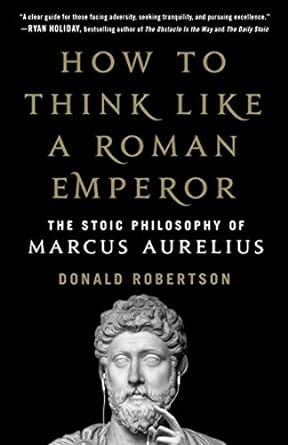I’m bringing this post out from behind the paywalled archive because we can all use some stoic philosophy in our lives at the moment—especially as it relates to our need to be in control. Many of you are new here since I first published this post a year ago, so this will be new for you. To my initial subscribers, enjoy the replay. To all of you, THANK-YOU for being here. I send you my appreciation and love for your kind support.
Every month, I offer up a recommendation on what I’ve been reading, listening to or watching. Usually, it’s something that prompts my thinking about what I am (un)learning.
Hello dear reader and Happy Thanksgiving to my American friends,
📚 Book: How to Think Like a Roman Emperor; The Stoic Philosophy of Marcus Aurelius. Written by Donald Robertson.
If you like history and are interested in mental health, then this book is a perfect combination of both. It was recommended by a retired lawyer friend, who said it had a huge impact on him and how he lived his life. I have underlined and dog eared so many pages, I will be buying him a new one. I intend to keep it as one of ‘those’ books which is never far from my bedside.1
“To learn how to die, according to the Stoics, is to unlearn how to be a slave.”
There is so much to unpack in this book, but a big concept is about control.
For some of us, it’s an automatic impulse—the need to control. We are a slave to it because it’s embedded in our DNA.
Stoic philosophy is the opposite of this. Open any page of this book and there are quotes such as the following:
“…if something is outside your control, then it’s simply irrational to demand that you should obtain or avoid it. It’s a contradiction to believe both that you must do something and also that it’s not within your power to do so. The Stoics viewed this confusion as the root cause of emotional suffering.”
“When we judge external things to be good or bad, it’s as though we forget what’s under our control and try to overextend our sphere of responsibility. The Stoics view only their own actions as good or bad, virtuous or vicious, and therefore classify all external things as indifferent, because they’re not entirely “up to us” in this sense.”
Imagine being indifferent to external things. And choosing how you react to them. Instead of acting on impulse and thinking you can control them. 🤯 (not looking at anyone in the mirror at all.)
I plan on giving this as a Christmas present—especially to my two adult sons. If you have men in your life who don’t always feel comfortable discussing mental health and tools to use in crisis or difficult situations, this is a gold mine. Life philosophy gleaned from a Roman Emperor, Marcus Aurelius, who leads battles, wars, people and politics, yet does so reflective of his natural impulses towards anger, judgment, fear and anxiety.
Thanksgiving bonus recommendation:
🦃 🎶 Song - Joni Mitchell. Both Sides Now.
Live from her surprise performance at the Newport Folk Festival in July 2022. Warning: This is a full body experience. Crying, smiling, goosebumps.2
As a commenter said under this video: “A 23 year old wrote a song for her 78 year old self to sing.”
I wish you a wonderful week ahead. And if you are with family during the upcoming holidays, remember the words of another Stoic philosopher, Epictetus.3
“It’s not things that upset us, but our judgments about things.”
Keep (un)learning. KVB. xo
If you haven’t already, please consider supporting the writing of Life (un)Learned and become a paid subscriber (at an incredibly nominal annual fee.) My goal is to grow this community in a fundamental way to include other offerings such as guest features, workshops and a podcast.
They include: The Power of Now by Eckhart Tolle, The Four Agreements by Don Miguel Ruiz and many others. But those two books, (and the Bible) are permanent fixtures on the nightstand. To reach for and read—any time and any page. They always deliver something relevant and needed at just the right time.
Inspired by a recent post in Gotham Girl by Alisa Kennedy Jones, in honour of Joni Mitchell’s 80th birthday last week. Scroll to the end for the video, but enjoy the full newsletter. Alisa is always funny.
A philosopher (50-135 AD) born into slavery, but who gained his freedom and became an influential teacher of philosophy. An early teacher and influencer of Marcus Aurelius.







Thank you again Kim for regifting this gem.
The stoics had it right. I’ve never read anything by Aurelius that didn’t sound bells of YES in my being. And what a fantastic book for young men! I think I’ll order one now for my nephew.🙏